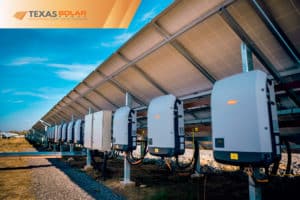Texas Solar Group is a great time to start thinking about solar energy and energy storage in Texas. Not only are weather conditions perfect for solar power, but tax incentives are also available. In this post, we’ll take a look at the many solar and energy storage tax incentives available in Texas. We’ll also discuss federal solar investment tax credits and property tax exemptions that might help offset solar installations costs. Keep reading to learn all you need to know about solar power in Texas!
Benefits of Solar and Storage in Texas
Solar energy is a great option for homeowners in Texas. Not only does it reduce your energy bill, but solar and storage together or separately can reduce your reliance on grid power and protect you from price spikes in the future. Contact us today to learn more about our financial incentives program – it could be just what you need to make the switch!
1. Increase your energy independence
A solar energy system for your house will allow you to produce your own power, taking advantage of the sun’s abundant and free energy. Today’s solar energy systems can produce enough energy to meet your energy needs at 100% or more. This makes you less dependent on the energy supplied by your utility. Your home can become more energy-efficient with a growing range of affordable products that will complement your solar energy system. These include power generators and battery storage.
2. Eliminate Your Power Bill
Your monthly energy bill will be reduced by achieving greater energy independence with your solar energy system. What’s the best part? When your solar power is installed, you can start saving immediately.
In Texas, homeowners who have monthly energy bills exceeding $100 per month can save thousands of dollars in the first year. Your savings increase as the electricity rates your utility charges you rise each year.
3. Take control of your electricity bill and have freedom
The Texas summer heat causes electricity usage to rise dramatically. This means that electricity bills can become astronomically expensive.
Installing solar panels before the summer heat is over will allow you to take advantage of longer daylight hours and produce more energy for your home. This will save you literally instantaneously from high energy bills.
Determine Your Eligibility for Texas Solar Incentives
There are a lot of solar incentives available in Texas, making it one of the most popular states for solar panel installation. Not only that, but solar storage systems are also becoming increasingly popular.
To find out if you qualify for solar or storage incentives, your local utility company will help you navigate the process. Once you know if you’re eligible and what system might work best for your needs, it’s time to start shopping!
Learn the Details of Texas Solar Incentives
Solar power is becoming an increasingly popular choice thanks to its many benefits. From reducing your energy bill to helping the environment, solar panels and storage systems are a great investment — one that can pay off big time if you take advantage of Texas solar incentives.
Before making any decisions, it’s important to have all the information you need about installation costs, system warranties, tax breaks available in your state/region etc. Getting a quote from several companies is also a good idea so that you can get an accurate estimate of what going solar will cost.
Once everything is decided, be sure to follow through with the installation by scheduling a date and time!
Which cities have better solar tax exemptions and rebates in Texas?
Solar tax exemptions and rebates in Texas vary from city to city, so it’s important to do your research before making a decision. However, some of the cities with the best deals include Arlington, Dallas, Fort Worth, Houston and San Antonio.
Investing in solar panels and storage can save you money on your energy bills regardless of where you live in Texas. To find out more about solar tax exemptions and rebates in your area contact local government officials or consult online resources like The Energy Source.
Texas Solar Panel Costs
The average cost of solar panels varies depending on the size of the system. More panels will result in higher equipment and installation costs. However, panels can be bought at bulk prices for a lower cost per Watt.
Apart from equipment and installation fees the cost of solar also includes inspection costs, permitting costs, and profit margins for solar installers. These costs will vary depending on the region and solar company.
Should I buy or lease my solar panels?
When it comes to renewable energy, solar panels are a top contender. Not only do they help reduce your carbon footprint, but solar power also fluctuates in price based on the weather so it makes sense to buy panels and store energy during peak hours (when electricity is most expensive).
There are many benefits to solar and storage in Texas – it’s important that you decide which option will work best for you. For example, buying your solar panels gives you more control over your long-term energy future while leasing can be cheaper in the short term.
The payback period (the time it takes for you to break even on your investment) will also differ depending on the size of your project and type of panel chosen. So make sure to compare quotes from different companies before making a decision!
Tax Incentives, Tax Credits, and Rebates in Texas
When it comes to solar energy, it’s important to be aware of all the tax incentives that are available in Texas. Contact your local utility company or go online to find more information about solar incentives in Texas.
There are a variety of programs available, so it’s worth taking a look to see which one will work best for your solar installation. Solar Texas incentives are a great way to save money on your solar installation, and help the state meet its renewable energy system goals!
Federal Solar Investment Tax Credits
Solar energy is becoming more and more popular each year, not only for its environmental benefits, but also its financial benefits. One of the most important incentives for solar installation is the ITC or federal solar investment tax credit.
This tax credit allows taxpayers who invest in solar panels to receive a 30% tax credit, which can be taken against their regular income taxes. The credit is renewable every three years, so it’s important to take advantage of the solar investment tax credit each year.
Once you have your panels installed, contact your accountant or tax preparer to find out more about taking the credit and other solar incentives in Texas. Federal solar investment tax credits are a major incentive for homeowners and businesses alike to switch over to solar energy!
Texas Solar Rebate and Tax Credits
Solar energy is quickly becoming a popular option in Texas, and there are many incentives available to help homeowners install solar panels. The tax credit and rebate program can be a big help, and depending on your installation, it could be as much as 30% of the cost of a solar installation.
Not only that, but solar power helps reduce your home’s carbon footprint – something that benefits everyone in the long run. So if you’re thinking of making the switch to solar power, don’t miss out on these solar Texas incentives. Contact the best solar installer Texas Solar Group.
Texas Solar Property Tax Exemption
If you’re looking to install solar energy in Texas, you may be eligible for a property taxes exemption. This allows homeowners and businesses to deduct the entirety of their solar system from their taxable income.
To be eligible, the installation must be complete and operational by December 31, 2017. Please consult your accountant or tax professional to find out more. In the meantime, solar energy is still a great investment, and solar companies are always looking for qualified contractors. So why not give solar Texas a try today? You won’t regret it!
Local Incentives
It’s no secret that energy is a huge topic of discussion right now. With prices soaring and the energy grid in a state of flux, it’s more important than ever to make informed choices when it comes to energy. Solar Texas offers a variety of incentives to help residents and businesses switch to solar power.
Tax credits, rebates, or even free installation are just a few of the incentives available. If you’re considering solar power, it’s important to research your local incentives first. Once you’ve found an incentive that’s right for you, get started on the installation process! Solar Texas is committed to making solar power accessible to everyone, so make 2016 the year you break through the energy crisis and switch to clean energy sources like solar!
How to choose the best Texas solar panel company
You should consider a variety of factors when looking at solar panel companies. This will ensure that you get the best return on your investment and, in some cases, even a net positive one.
Equipment: Not all solar panels are made equal. To determine how much energy panels can produce, you should evaluate their energy efficiency. This includes power rating, power tolerance and efficiency. This compares to the industry average of 16% to 18% solar panel efficiency.
Even though the most efficient panels are often the lowest cost per kW, they may still be the most effective. The best value will vary depending on the number of panels you install, so it is worth doing some calculations.
Quality control: Make sure to verify the quality of the manufacturer’s solar panel company. Also, make sure you check their equipment durability, production, warranties, and other assurances.
On average, the industry’s average manufacturer warranty is between 10 and 25 years. You should ensure that your panels are designed to withstand extreme weather conditions if you live in an area where solar panel installations may be damaged.
Installation: Review the certifications, licenses and warranties of any solar panel company. Also, look at reviews and reputation. A full-time, knowledgeable team will be available to answer your questions throughout the installation process and for the life of your solar system.
Local incentives: A study done by the National Renewable Energy Laboratory, (NREL), found that larger companies tend to be 10% more expensive than smaller local companies for the same equipment. You can save money by choosing a local company.
Frequently Asked Questions
Is it true that you don’t have to pay taxes on your investment if you use a federal tax credit and state incentive programs?
Yes, it is true that you don’t have to pay taxes on your investment if you use a federal or statewide solar tax credit and state incentive programs. The most popular state incentives for solar energy are the Texas Renewable Energy Credit (TREC) and Solar Investment Tax Credits (SITC).
SITC is a tax credit offered by the state of Texas that allows tax credit investors to claim a tax credit of 30% of their investment in solar energy systems up to $8 million.
You can find more information about TREC and SITC on the websites of the Texas Department of State Health Services or Office of Economic Development.
Which of these things are considered as “qualifying expenses” under the program: installation, maintenance, insurance or electricity bill reduction?
Installation is not a qualifying expense, while maintenance and electricity bill reduction are. This means that if you have installation or maintenance expenses, those expenses are considered as two separate expenses. You then need to apply for Texas solar rebates in order to receive your tax credit.
Can I take a deduction for my interest on loans taken to pay for my system’s purchase and installation costs?
Yes, you can deduct the interest you paid on loans taken to pay for your system’s purchase and installation costs. This includes both personal and business loans. The amount of deduction you’re allowed is based on your modified adjusted gross income (MAGI). If you took out a loan in 2017, 2018 or 2019, then you may be able to use the new Tax Cuts and Jobs Act as a tax break. Consult with a tax professional to learn more.
What is an FIT (Financing Institution Trust)?
An FIT is an organization that finances solar energy projects in the state of Texas. These organizations offer low interest rates and long loan periods to help businesses and homeowners install solar panel systems. With the help of an FIT, you can get up to 100% financing for your solar project – meaning no payments until the system is actually installed.
What is net metering and how does it work?
Net energy metering is a policy that allows solar power system customers to sell their excess energy back to the grid. In simple terms, this helps reduce energy bills for solar power system owners and reduces carbon emissions from fossil fuels used by utilities. Typically, homeowners are incentivized through reductions in their monthly utility bills or payments into a conservation fund.
What types of incentives do we have in Texas for companies that go solar?
Incentives for companies that go solar in Texas can vary depending on a number of factors, including the company size, type of business, and amount of solar PV installed. However, some common incentives include tax breaks, renewable energy credits (RECs), net metering or power purchase agreements (PPAs). Make sure to speak to a qualified Solar Advisor to find out what incentives are available specifically for your solar energy company and needs.
Conclusion
Solar energy is a renewable and clean energy source that is growing in popularity all over the world. With solar panels becoming an increasingly affordable option, it’s no wonder that solar incentives are becoming more and more popular. In this blog post, we have covered the different solar incentives available in Texas, from tax incentives to property tax exemptions. Make sure to take a look at our website for more information on solar energy and solar panels!




